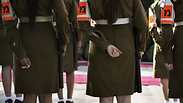
40% of religious girls' schools shun IDF
Army representatives denied access to nearly half of religious girls' schools, Aluma association says, while national service representatives are permitted to enter and offer students information on available options.
According to the Aluma association, the schools' rabbis and principals advise the girls to choose "a significant service," but in fact present them with a partial picture while concealing information about the variety of options available to them.
Aluma CEO Yifat Sela said during a discussion held last week at the Knesset's Committee on the Status of Women that hundreds of religious girls participate in events organized by the association to offer information on the IDF, which she said points to a lot of interest in military service, yet army representatives have no access to about half of the educational institutions.
About 30% of the schools allow the army to conduct PR activity on the premises, and another 30% cooperate as well – but ask the military representatives to conduct the activity after school hours and not on the institution's property.
Only 33% of schools support recruits
Sela rejected rabbis' claims that girls who join the army move away from religion, noting that a survey conducted by Aluma proved that there is no significant different in maintaining religious identity between girls who serve in the army and those who choose national service.
According to Sela, while 80% of parents support their daughters who enlist, only 33% of the schools offer their support to the recruits. "There is no adequacy between the parents' attitude towards the enlistment and the religious education system's attitude," she said.
Michal De-Haan, deputy chairwoman of the Education Ministry's Religious Education Administration, rejected the claims, saying that the system offers "100% support" to every girl seeking to enlist.
"Who said that the right way is to open up the schools?" she asked. "All principals are exposed to information, and a girl interested in enlisting receives guidance from the counselor. We start talking about significant service in the 10th grade, and present the options during education classes."
Beit Hillel rabbis calls for 'spiritual preparation'
Knesset Members Aliza Lavi of the Yesh Atid faction, chairwoman of the Committee on the Status of Women, accused the heads of the state-religious education system of "turning a blind eye to the changes taking place among religious girls and in the IDF."
According to MK Lavi, "The army enters general high schools and explains, but doesn't enter religious girls' high schools.
"I'm not even talking about whether one should serve in the army or not," she added. "This isn't an ideological-halachic discussion. The question is whether all girls are exposed to the available information about the special tracks offered by the army at the suitable time, when the girl and her parents make the decision… The information is kept from the girls. This is a system failure."
The IDF chief of staff's advisor on women's affairs, Brigadier-General Rachel Tevet-Wiesel, who is a religious woman herself, briefed the committee on the efforts made by the IDF to provide every religious girl with suitable conditions matching her lifestyle.
Rabbi Ronen Neuwirth, CEO of the modern Orthodox Beit Hillel organization, presented a rabbinical perspective on the issue.
"The educational system's role is critical," he said. "The lack of information can sometimes lead to rebellion. Girls do things to spite, and reach inappropriate places. It is our duty as rabbis and educators not to shut down, but to offer tools."
The rabbi said that blocking information was problematic, and that instead there is a need to focus on spiritual preparation for the service – wherever it may be. "Instead of investing efforts in fighting the girls, let's invest resources in building seminaries for girls," he stated.
"Today, every year, the seminaries are forced to reject about 100 appeals from girls due to lack of room, and they go to the army without spiritual preparation. There are also many books of military law and war for boys, but there is not a single book for girls asking different questions."










